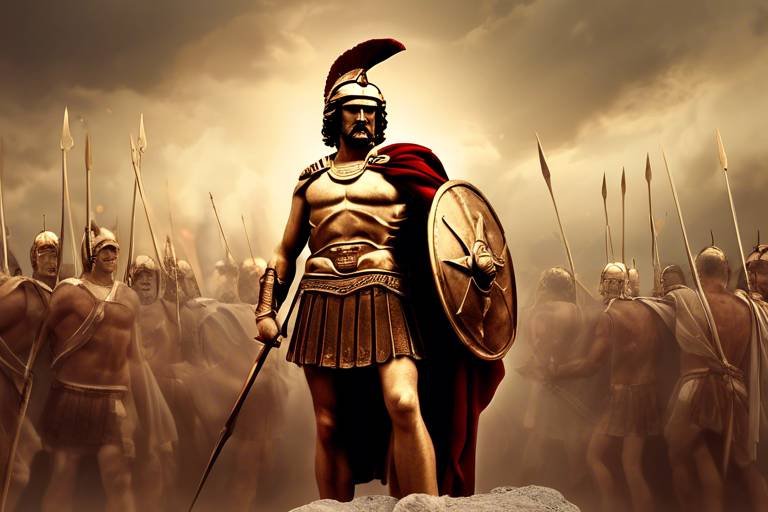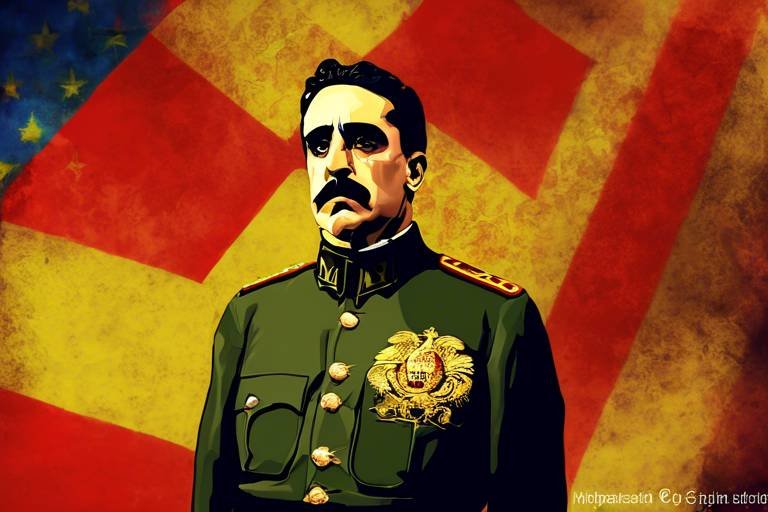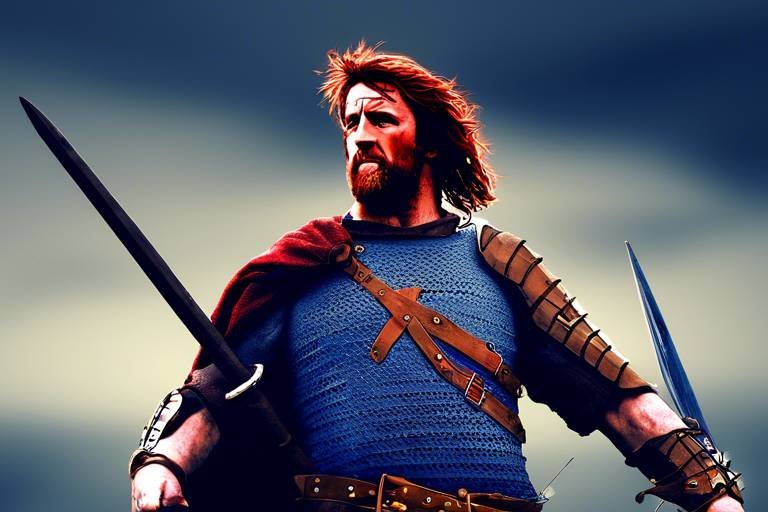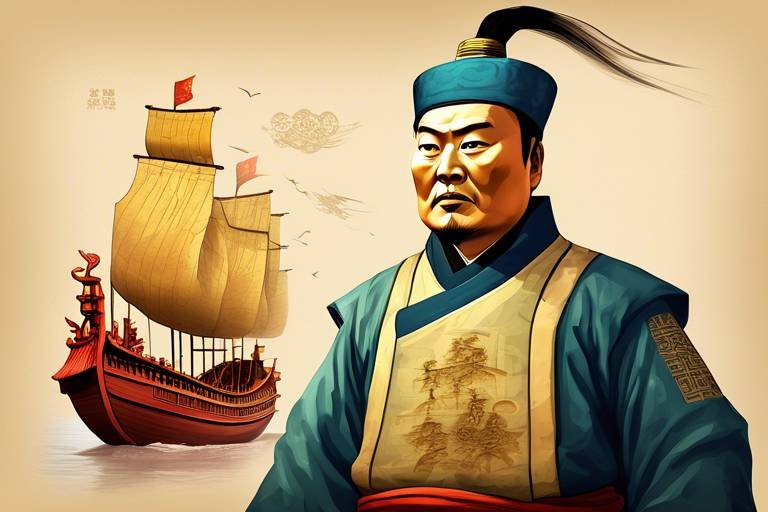Gustav II Adolf: The Swedish King and Military Leader
Known for his exceptional military skills and strategic leadership, Gustav II Adolf, also referred to as Gustavus Adolphus, was a prominent figure in Swedish history during the 17th century. His legacy as a monarch and military leader continues to inspire generations, shaping the course of Sweden's political and military landscape.

Early Life and Ascension to the Throne
Exploring the life and legacy of Gustav II Adolf, the influential Swedish monarch known for his military prowess and strategic leadership during the Thirty Years' War in the 17th century.
Gustav II Adolf, born on December 9, 1594, in Stockholm, Sweden, was the son of Charles IX of Sweden and Christina of Holstein-Gottorp. His early life was marked by turmoil and uncertainty, as he ascended to the throne at the tender age of 16 following the death of his father. Despite his youth, Gustav II Adolf displayed remarkable maturity and determination, quickly asserting his authority as the King of Sweden.
His upbringing was influenced by the turbulent political climate of the time, with Sweden embroiled in conflicts with neighboring powers. Gustav II Adolf received a comprehensive education that included military training, history, and politics, preparing him for the challenges of rulership.
Upon his coronation in 1611, Gustav II Adolf faced a nation in need of strong leadership and stability. His ascension to the throne marked the beginning of a new era for Sweden, characterized by ambitious military campaigns and strategic reforms.

Military Reforms and Innovations
Gustav II Adolf, the Swedish King and Military Leader, was not just a ruler but a visionary who revolutionized military tactics and strategies during the 17th century. His reign marked a significant shift in warfare, thanks to his innovative military reforms and technological advancements that elevated the Swedish army to unprecedented levels of strength and efficiency.
One of Gustav II Adolf's most notable military reforms was the implementation of a new system of conscription, known as the allotment system. This system ensured a steady recruitment of soldiers by assigning land to farmers in exchange for military service. By doing so, Gustav II Adolf created a standing army that was always ready for battle, giving Sweden a strategic advantage over its adversaries.
In addition to the allotment system, Gustav II Adolf introduced the concept of combined arms tactics, which involved the coordinated use of infantry, cavalry, and artillery in battle. This approach allowed the Swedish army to adapt to different combat situations effectively, outmaneuvering and overpowering larger enemy forces.
Furthermore, Gustav II Adolf was a proponent of military innovation, constantly seeking ways to improve weaponry and equipment. Under his leadership, the Swedish army adopted the pike and shot formation, a military tactic that combined the use of firearms with traditional pikes to create a versatile and deadly fighting force.
Moreover, Gustav II Adolf's emphasis on training and discipline within the army set a new standard for military professionalism. He established military academies to educate officers and soldiers, ensuring that the Swedish forces were not only well-equipped but also well-trained and organized.
Overall, Gustav II Adolf's military reforms and innovations were instrumental in shaping the Swedish army into a formidable military power that could rival even the most advanced European forces of the time. His strategic vision and commitment to excellence left a lasting legacy that influenced military tactics and strategies for generations to come.

Role in the Thirty Years' War
During the turbulent period of the Thirty Years' War, Gustav II Adolf emerged as a central figure whose strategic acumen and military prowess reshaped the course of European history. Leading the Protestant forces against the Catholic Habsburgs, Gustav II Adolf's intervention in the conflict was nothing short of revolutionary. His innovative military tactics, coupled with a keen understanding of battlefield dynamics, enabled him to achieve remarkable victories that altered the balance of power in the region.
One of Gustav II Adolf's most notable contributions to the war was his introduction of the Swedish Caroleans, a disciplined and well-equipped infantry that revolutionized warfare at the time. By implementing new formations and strategies, such as the oblique order, Gustav II Adolf was able to outmaneuver his opponents and secure decisive triumphs on the battlefield. His emphasis on mobility, firepower, and coordination set a new standard for military excellence and influenced tactics for generations to come.
Furthermore, Gustav II Adolf's diplomatic finesse played a crucial role in shaping the alliances that defined the conflict. By forging partnerships with key Protestant states and leveraging his military successes to rally support, he effectively countered the formidable Habsburg forces and prevented the domination of Catholic powers in Europe. His ability to navigate the complex web of political interests and maintain the cohesion of the Protestant coalition underscored his strategic genius and leadership capabilities.
Despite facing formidable adversaries and enduring significant challenges, Gustav II Adolf's unwavering commitment to the Protestant cause and his relentless pursuit of victory ultimately turned the tide of the war in favor of the Protestant forces. His audacious campaigns, including the pivotal Battle of Breitenfeld and the Battle of Lützen, showcased his tactical brilliance and solidified his reputation as one of the greatest military commanders of his time.
In conclusion, Gustav II Adolf's role in the Thirty Years' War was instrumental in shaping the outcome of the conflict and establishing Sweden as a major European power. His legacy as a visionary military leader and a champion of Protestantism endures to this day, serving as a testament to his enduring impact on the course of history.

Legacy and Impact on Sweden
Gustav II Adolf, the Swedish King and Military Leader, left a profound legacy that continues to shape Sweden's political, military, and cultural landscape to this day. His reign marked a pivotal moment in Swedish history, characterized by strategic brilliance and military prowess that elevated Sweden to a position of power and influence on the European stage.
One of Gustav II Adolf's most enduring legacies was his transformation of the Swedish army through innovative military reforms and technological advancements. By introducing new tactics and organizational structures, he turned the Swedish forces into a formidable and well-disciplined military machine that achieved remarkable success on the battlefield.
Furthermore, Gustav II Adolf's role in the Thirty Years' War solidified his reputation as a skilled military strategist and a diplomatic mastermind. His campaigns and alliances during the war not only secured Sweden's position as a major European power but also influenced the outcome of the conflict, shaping the future geopolitical landscape of the continent.
Aside from his military achievements, Gustav II Adolf was also known for his progressive policies on religious tolerance. His approach to different faiths and his efforts to promote religious freedom within Sweden had a lasting impact on the country's social fabric, fostering a climate of acceptance and diversity.
On a personal level, Gustav II Adolf's marriage to Maria Eleonora of Brandenburg and his family dynamics as a monarch provided insights into his character and leadership style. Despite the challenges he faced, both on the battlefield and within his own family, Gustav II Adolf remained a respected and influential figure in Swedish history.
Tragically, Gustav II Adolf's life was cut short on the battlefield, specifically in the Battle of Lützen, where he met an untimely end. The circumstances surrounding his death sparked controversies and theories that have intrigued historians and enthusiasts alike, adding a layer of mystery to his already legendary persona.
Today, Gustav II Adolf is commemorated in various ways across Sweden, from statues and monuments to his portrayal in literature and popular culture. His historical significance as a visionary leader and a symbol of Swedish power and resilience continues to inspire generations, ensuring that his legacy endures for centuries to come.

Religious Tolerance and Policies
Gustav II Adolf, the Swedish King and Military Leader, was not only known for his strategic military leadership during the Thirty Years' War but also for his progressive approach to religious tolerance and policies. Gustav II Adolf's reign marked a significant shift towards religious freedom and acceptance in Sweden, setting a precedent for future generations.
One of Gustav II Adolf's most notable contributions in the realm of religious tolerance was the issuance of the Peace of Westphalia in 1632, which granted religious freedom to Protestants in the Holy Roman Empire. This landmark treaty not only secured the rights of Protestants but also paved the way for greater religious diversity and coexistence in Europe.
Furthermore, Gustav II Adolf implemented policies that aimed to protect the rights of religious minorities within Sweden, including Catholics, Jews, and Orthodox Christians. By fostering an environment of inclusivity and respect for differing beliefs, Gustav II Adolf sought to create a harmonious society where individuals could practice their faith without fear of persecution.
Under his rule, Sweden became a safe haven for those fleeing religious persecution in other parts of Europe, attracting intellectuals, artists, and merchants from diverse religious backgrounds. This influx of talent and expertise enriched Swedish culture and contributed to the nation's reputation as a beacon of religious tolerance.
Moreover, Gustav II Adolf's commitment to religious pluralism extended beyond mere rhetoric, as he actively promoted interfaith dialogue and cooperation among religious communities. By fostering mutual understanding and respect, Gustav II Adolf sought to build a more cohesive society where individuals could coexist peacefully despite their religious differences.
In conclusion, Gustav II Adolf's legacy in the realm of religious tolerance and policies is a testament to his progressive vision and unwavering commitment to creating a society where individuals of all faiths could thrive. His enduring impact on Sweden's approach to religious diversity continues to resonate to this day, serving as a reminder of the power of inclusivity and acceptance in shaping a more harmonious world.

Personal Life and Family
Gustav II Adolf, known for his military prowess and strategic leadership, had a personal life and family that added depth to his character beyond the battlefield. Despite his role as a powerful monarch, Gustav II Adolf valued his personal relationships and family dynamics.
One of the significant aspects of Gustav II Adolf's personal life was his marriage to Maria Eleonora of Brandenburg. Their union played a crucial role in diplomatic relations and alliances during his reign. Maria Eleonora's influence on Gustav II Adolf and their family life reflected the complexities of royal marriages in the 17th century.
As a monarch, Gustav II Adolf faced the challenges of balancing his military responsibilities with his role as a husband and father. His family life provided a glimpse into the personal struggles and sacrifices he made for the greater good of Sweden.
Despite the demands of his position, Gustav II Adolf was known to be a devoted father to his daughter, Christina. The bond between father and daughter showcased a softer side of the formidable king, highlighting his capacity for love and affection within the confines of royal duty.
Gustav II Adolf's personal life and family relationships humanized the legendary military leader, offering a glimpse into the man behind the crown. His legacy extends beyond his military achievements, encompassing the personal connections and familial ties that shaped his reign and contributed to his enduring impact on Swedish history.

Death and Controversies
Exploring the tumultuous end of Gustav II Adolf's life unveils a chapter marred by both tragedy and controversy. The Swedish King met his demise on the battlefield of Lützen, a pivotal moment that shook the foundations of his kingdom and reverberated throughout Europe. The circumstances surrounding his untimely death have sparked debates and theories that continue to intrigue historians and enthusiasts alike.
As the fog of war lifted on that fateful day, the aftermath of the Battle of Lützen revealed a nation mourning the loss of its beloved monarch. Gustav II Adolf's death cast a shadow of uncertainty over Sweden, raising questions about the future of the kingdom and the stability of its leadership. Rumors and speculations swirled in the wake of his passing, fueling controversies that lingered for years to come.
One of the most enduring controversies surrounding Gustav II Adolf's death is the debate over the circumstances that led to his fatal injury. While historical accounts attribute his demise to a musket shot during the heat of battle, some theories suggest foul play or assassination plots orchestrated by his enemies. The mystery shrouding the exact events of that day has fueled speculation and conspiracy theories, adding layers of intrigue to the King's tragic end.
Moreover, the legacy of Gustav II Adolf's death extends beyond the battlefield, encompassing political ramifications and power struggles within the Swedish court. The vacuum left by his absence sparked internal conflicts and challenges to the throne, setting the stage for a period of uncertainty and upheaval in the aftermath of his passing. The repercussions of his death reverberated far beyond the borders of Sweden, shaping the course of European history in unforeseen ways.
Despite the controversies and uncertainties surrounding Gustav II Adolf's death, one thing remains clear: his impact on Sweden and the wider world endures through the annals of history. The enigmatic circumstances of his untimely demise only serve to deepen the mystique and fascination surrounding the legendary Swedish King, ensuring that his legacy continues to captivate generations to come.

Historical Significance and Commemoration
Gustav II Adolf, also known as Gustavus Adolphus, holds immense historical significance as the Swedish King and Military Leader of the 17th century. His strategic prowess and leadership during the Thirty Years' War left a lasting impact on Sweden and the course of European history.
One of the key aspects of Gustav II Adolf's legacy is his innovative military reforms and tactics that revolutionized warfare during his time. By implementing organizational changes and embracing technological advancements, he transformed the Swedish army into a formidable force that stood out on the battlefield.
His role in the Thirty Years' War was pivotal, with his military campaigns and alliances shaping the outcome of the conflict. Gustav II Adolf's interventions not only secured victories for Sweden but also influenced the balance of power in Europe at that time.
Despite his military achievements, Gustav II Adolf was also known for his policies promoting religious tolerance. His approach towards different faiths and the reforms he implemented had a profound impact on Swedish society, fostering a more inclusive and diverse cultural environment.
On a personal level, Gustav II Adolf's marriage to Maria Eleonora of Brandenburg and his family dynamics as a monarch provide insights into his private life. These relationships offer a glimpse into the human side of the renowned military leader.
The circumstances surrounding Gustav II Adolf's untimely death in the Battle of Lützen have sparked controversies and theories over the years. The mystery surrounding his demise adds a layer of intrigue to his already legendary status in history.
Today, Gustav II Adolf is remembered for his historical significance not only in Sweden but also in literature and popular culture. His portrayal in various mediums and the ways in which he is commemorated in modern-day Sweden serve as a testament to his enduring legacy as a visionary leader.
Frequently Asked Questions
- What were Gustav II Adolf's major military achievements?
Gustav II Adolf is renowned for his military prowess, with notable achievements including modernizing the Swedish army, introducing infantry tactics, and securing victories in battles like Breitenfeld and Lützen during the Thirty Years' War.
- How did Gustav II Adolf contribute to religious tolerance in Sweden?
Gustav II Adolf implemented policies promoting religious freedom, allowing Catholics and Protestants to practice their faiths openly. His Edict of Restitution aimed to restore religious rights and properties to those affected by the war.
- What is the significance of Gustav II Adolf's legacy in modern-day Sweden?
Gustav II Adolf's legacy remains influential in Sweden, as he is remembered for his military leadership, religious tolerance, and contributions to the country's cultural and political development. His image is still commemorated in various forms across the nation.



















